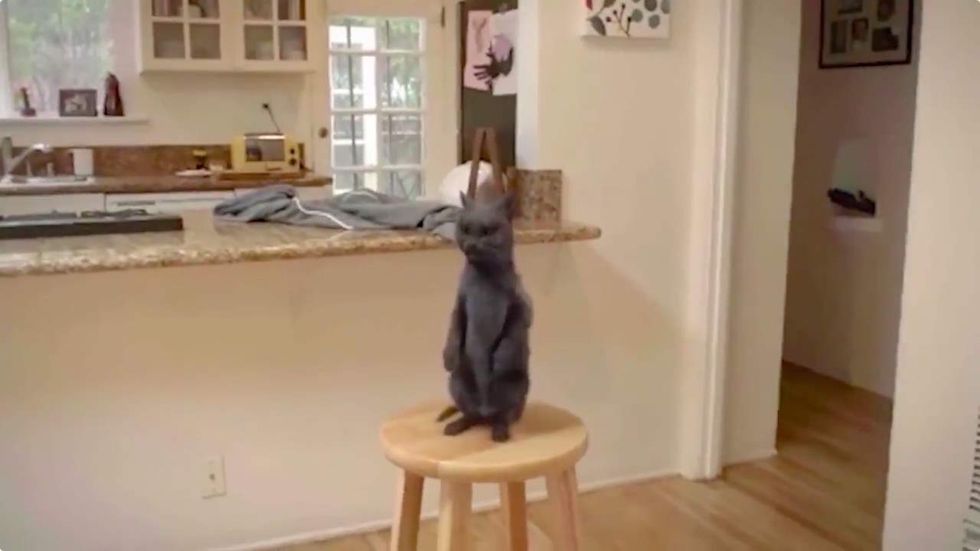
Until their plan was thwarted by Mashable, the leadership at PETA was trying to convince media outlets to write deceptive articles, claiming a fabricated cat abuse video was legitimate. (Image Source: Twitter Screenshot)

People for the Ethical Treatment of Animals has never shied away from hype and outrage, but this time the animal-rights group might have gone too far.
PETA has produced and released a disturbing video depicting a man yelling at and slapping his pet cat. The video, though, is fake. The gray cat is a computer-generated image, but the animal-rights group apparently didn’t want viewers to know that.
In fact, according to Mashable, PETA was trying to convince duplicitous media outlets to knowingly publish a fabricated video as part of an organized effort to make the fake clip go viral. That plan was foiled, however, when Mashable went public.
The PR agency Press Kitchen approached a writer at Mashable through email late last week, according to the outlet, and while the reporter initially ignored the pitch, the agency followed up on the story two more times, hoping the writer would cover the video.
As it turns out, Mashable did report on the video — but probably not in the way PETA was hoping.
“[G]iven the nature of the effort and the scourge of misinformation in 2017 — combined with the fact that the video is truly bizarre and gross — we’re making this fake campaign public,” the website wrote.
Following Mashable’s story, PETA released a statement of its own, saying the news outlet just “didn’t like” the idea. But a statement from Mashable’s staff implied much more than that, saying the website’s writers “don’t take kindly to being approached for partnership on a shady, ethically ass-backwards marketing campaign.”
PETA’s statement continued:
When we heard yesterday afternoon that Mashable wasn’t interested, we regrouped and decided to launch it ourselves in a single video as a clearly-labelled parody so that there would be no confusion. We decided this because of the concerns Mashable raised. We were taken aback last night by Mashable’s story and frankly surprised that Mashable didn’t wait for our response, particularly as the video had not even been publicly released.
So the original plan, before PETA’s alleged scheme was foiled, was for the agency that produced the fake video to anonymously publish to YouTube the clip showing a man abusing his cat, hoping to convince people it was real and, thereby, generating outrage.
Here is how the PR agency reportedly pitched the idea to Mashable:
What we’d like to do is have Mashable debut this video of a cat, created with computer-generated imagery (CGI), being abused, which will have been planted on YouTube anonymously by the ad agency who created it for PETA. Your posting of the provocative piece would simply be to acknowledge that it’s in circulation — not to make any claims about its authenticity.When the video has drawn the critical response and the number of views we're anticipating (ideally, into the millions), we would then have you reveal to the world that the cat was NOT harmed, but was actually created with CGI by posting this behind-the-scenes video. It reveals the reasons for the creation of the first video and asks people to avoid circuses that use lions, tigers, or any other live animals.
That deceptive plan clearly didn’t work, so PETA just published the entire “Cat Tricks” video — with the behind-the-scenes explanation included — to their website Wednesday.
The stated purpose of the video is to show viewers the abuse that big cats in movies, zoos, and circuses often experience.
“Abuse is abuse, whether the animal being smacked is a house cat, or a tiger,” PETA Senior Vice President Lisa Lange said. “PETA’s video illustrates why not to buy a ticket to a circus that uses animals — or exploit a live animal for a TV show or movie.”
But spreading fabricated content in an era of fake news is not the way to raise awareness, Mashable noted. Spreading untrue content for attention, according to the outlet, is “wrong and irresponsible.”
This is not the first time PETA has found itself in hot water.
Last year, the animal-rights group drew intense backlash when the organization’s president, Ingrid Newkirk, seemed to equate women’s rights and chickens’ rights.
“Discrimination is discrimination,” the quote read, “whether you’re a woman or a chicken.”
And earlier this year, PETA claimed milk is a “symbol of white supremacy.”
“Milk,” the animal-rights group argued, “has long been a symbol used by white supremacists as a thinly veiled allegory for racial purity.”
Only time will tell what the reaction will be to this latest stunt by PETA, but the first reviews aren’t looking too good.